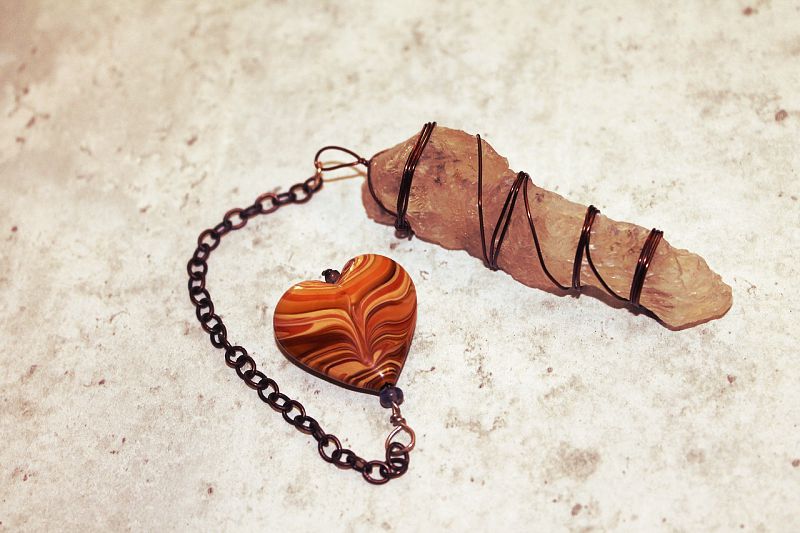Guest writer for Wake Up World
The pendulum is a humble, but powerful, tool of self-insight.
I have used the pendulum on and off for years and it’s a wonderful way of gaining quick, straight-forward, and often surprising answers!
However, while the dowsing pendulum is an inexpensive and effective form of divination, there are some things you need to know before starting.
[pro_ad_display_adzone id=”110028″]
What is Divination?
There are many different definitions of divination, and often they describe the practice of fortune telling. But I want to be clear here. I neither believe in nor support fortune telling. I believe that we have the power to shape our own futures. No path is set in stone until we decide to shape it.
Instead, divination to me is a form of gaining insight into a question or situation. Divination can also help the seeker to foresee the potential outcome of a choice or decision. Therefore, I personally approach any form of divination as a method of gaining higher knowledge, mental clarity, and spiritual/material guidance.
What is a Dowsing Pendulum?
A dowsing pendulum is typically a rock or crystal that hangs on the end of a string or chain. The pendulum is used as a way of gaining spiritual and material insight. Traditionally, dowsing pendulums were used to locate hidden water, minerals, and other hidden objects beneath the ground.
How Does it Work?
Do we receive answers by magic? By spirits? By psychic powers? My preferred answer is that the dowsing pendulum works by connecting us to the unconscious mind, also known as the Akashic Records.
When we ask a question, our unconscious mind responds by influencing the nerve endings in our fingers causing the pendulum to swing in response. In other words, our body outwardly expresses our inner knowing.
How to Use a Dowsing Pendulum For Divination

Using a dowsing pendulum is one of the easiest forms of divination, making it suitable for virtually anyone to practice. You definitely don’t need to be ‘psychic’ to use it! Here are some tips to help get you started:
1. Choose the right pendulum
Think about what type of material or crystal you would like your pendulum to possess. What is your power stone (i.e. the stone you resonate and work with the best in your life)? If you have access to a metaphysical store, hold each pendulum and see how it interacts with you. If you don’t have access to a store that stocks pendulums, consider purchasing one online. Here are some examples:
- Amethyst dowsing pendulum
- Chakra dowsing pendulum
- Rose quartz dowsing pendulum
- Silver Egyptian dowsing pendulum
- Copper dowsing pendulum
- Dowsing pendulum set (multiple varieties)
Alternatively, you can try to make your own pendulum by using string and trying a heavy object on the end (mind you, not too heavy!) One easy DIY pendulum can be made by using the string of a tea bag and tying a simple glass bead on the end.
2. Cleanse the pendulum
Once you have found the right dowsing pendulum for you, you’ll need to clear it of residual energy. You can energetically cleanse your pendulum in the same way you would clear a crystal. For example, you might like to run it under cold or hot water, bury it in the soil for a day, place it under the moonlight, use a singing bowl, light a smudge stick, and so forth. Once you sense that the pendulum is clear, you can then use it.
3. Build a relationship with the pendulum
Building a relationship with your pendulum is quite straight-forward, however like anything worth pursuing, it takes a bit of time and commitment.
In order to learn your pendulum’s ‘language’ and attune it to your unconscious mind, you will need to ask it a few questions.
Take the following steps:
1. Take a few deep breaths. This will help to ground and center you.
2. Ask for guidance and support. I like to say a prayer to my Soul (Higher Self) and Spirit Guides to ensure that I receive the clearest, most objective answers possible. I encourage you to do the same if this resonates with you.
3. Next, ask your pendulum some questions in order to determine what means “yes,” “no,” and “maybe.” Your pendulum may swing backwards, forwards, side to side, clockwise or counterclockwise. In order to understand what the directions mean, try the following two approaches and see which one you like better:
- The first approach is to simply say to the pendulum, “show me a yes” and wait for it to swing. Then say, “show me a no” and wait for it to swing. Finally, ask it “show me maybe” and wait for its response. Thank you pendulum, note the directions and proceed with your question.
- The second approach is to ask the pendulum questions that will establish objective responses. For example, if you want to know in what direction your dowsing pendulum will swing “yes,” ask it affirmative questions such as “Am I male/female?” “Am I __ years old?” “Are my eyes blue?” Notice which direction your pendulum swings. Then ask it questions that signal “no.” For example, “Is my dog still alive?” “Are my parents together?” “Do I love swimming?” Make sure you ask questions that have clear and definitive answers.
Repeat this step every time you use your pendulum because it doesn’t always choose the same directional responses!
4. Ask your pendulum questions
Now your pendulum is ready to use! Ensure that you are comfortably seated. To begin your practice, you will want to make sure that your arm is stable. So try to put your elbow on the table for added support. Hold your pendulum loosely and gently between your thumb and index finger – with just enough pressure to prevent it from falling.
Next, call to mind a question you’re seeking a clear response for. You can ask your pendulum virtually anything (within reason, please see the next section). Topics can range from locating a missing object, deciding what to wear on a date, and choosing a field of study, to uncovering your hidden feelings, motives, desires, gifts, and dreams. Your dowsing pendulum can be used to answer everyday questions and those relating to money and relationships, all the way to profound spiritual/existential issues.
Some websites and pendulum books (such as this one) also offer charts that help you to assess the health of different organs within your body and chakras.
Use Your Pendulum Wisely
Like any spiritual tool, pendulums can be misused. Here are some words of caution:
- Please don’t use your pendulum when you’re feeling emotionally or mentally imbalanced (e.g. if you’re stressed, angry, tired, etc.) as this will give you inaccurate responses. To ensure that you’re in the right frame of mind, you can ask your pendulum before beginning, “Is now a good time to dowse?”
- Please don’t use your pendulum as a replacement for medical expertise. Don’t endanger yourself. If you have a serious health concern, please seek medical assistance.
- Please ensure that you are dowsing only for yourself, not another (unless they give you explicit permission). Even if you’re dowsing for another, please assess whether you’re skilled enough to proceed.
- Please approach your pendulum dowsing with an open and unbiased mindset. If you have already made up your mind regarding something, it’s likely that this will be reflected in your dowsing.
- Please understand the limited nature of pendulum dowsing. Sometimes, it is much better to consult other forms of divination (such as tarot, runes, I Ching, scrying, etc.) which give you multi-layered answers to consider. Personally, I always try to supplement dowsing with another form of divination which gives me more information than a “yes,” “no” or “maybe” response.
- Please don’t become overly reliant on pendulum dowsing. This is a form of divination to help you make decisions, but it shouldn’t be the sole way you make decisions. Please don’t use it as a crutch. It is important that you take self-responsibility and consciously make decisions. Don’t use the excuse of “the pendulum told you to” in order to bypass your responsibility, and then blame it if anything goes wrong.
If you can think of any other ethical concerns, please let me know below.
***
Finally, before each pendulum session, you might like to preface with the following questions:
- CAN I? (Am I ready to ask this question?)
- MAY I? (Do I have permission to ask this question? This is useful to ask when you are dowsing for another person such as a friend or family member. Remember that it’s still possible to get a “no” even if the person has consciously said “yes” to you. In such cases, don’t proceed.)
- SHOULD I? (Is it appropriate for me to ask this question? As a general rule, try to avoid using “should” in your major question because it tends to make judgment calls which you need to take responsibility for, not the pendulum. Only use “should” in your preliminary question.)
That’s it!
I hope you enjoy experimenting with this amazing tool. If you want to share any tips or bits of advice, please share in the comments.
About the author:
Aletheia Luna is a prolific psychospiritual writer, author, and spiritual mentor whose work has touched the lives of millions worldwide. As a survivor of fundamentalist religious abuse, her mission is to help others find love, strength, and inner light in even the darkest places. She is the author of hundreds of popular articles, as well as numerous books and journals on the topics of Self-Love, Spiritual Awakening, and more. See more of her work at lonerwolf.com.
This article, How to Use a Dowsing Pendulum for Divination – A Beginner’s Guide, was originally published on lonerwolf.com, reproduced with permission.
[pro_ad_display_adzone id=”110027″]








